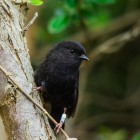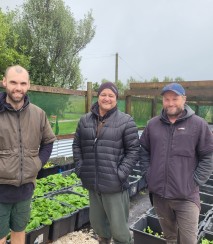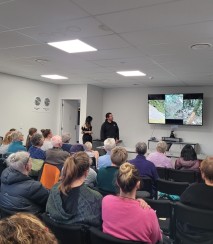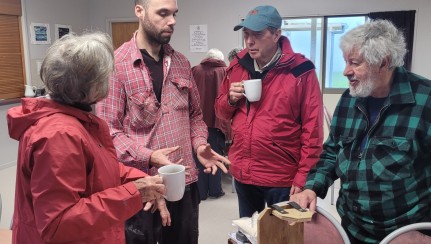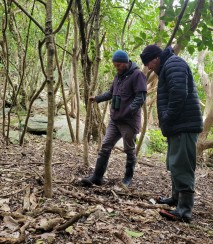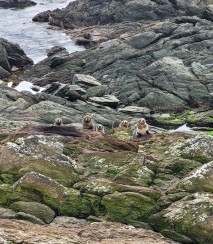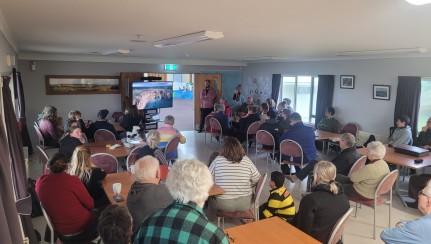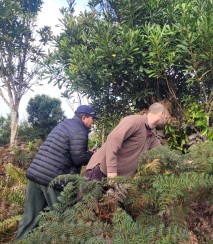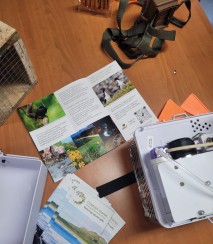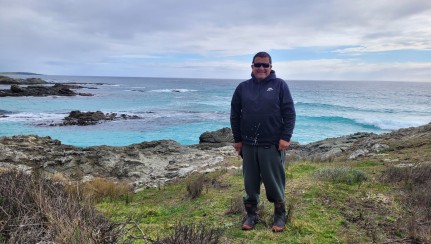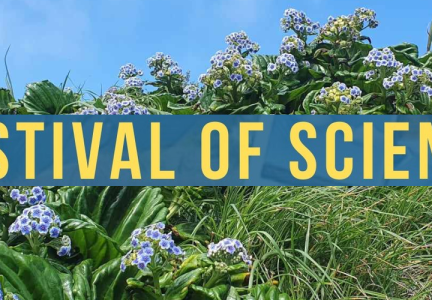
Blog and news
Celebrating the science of predator control
August 2024 marked the fourth annual Chatham Islands Festival of Science. Our Trust took part in two activities, adding predator control and restoration to the impressive range of scientific topics the event celebrated.
A nesting Pitt Island shag at Point Munning, spotted while showing conservationist Graeme Atkins around the island.
The Right Tools - large-scale predator control and restoration
Predator control and restoration are an important part of the Chatham Islands’ future. As we’re still in early phases of Predator Free Chathams, we wanted to bring someone over to share their experience in kickstarting a major community- and iwi-led predator control and restoration programme.
Graeme Atkins joined us from the rural East Cape to talk about his experience with Raukūmara Pae Maunga. This project is focused on helping the ngahere of te Raukūmara ranges thrive. The mahi started after locals noticed a significant decline of the bush, impacting not just wildlife and plants but the people in the area. The kaupapa is an iwi-led response group managed by Te Whanau a Apanui and Ngāti Porou.
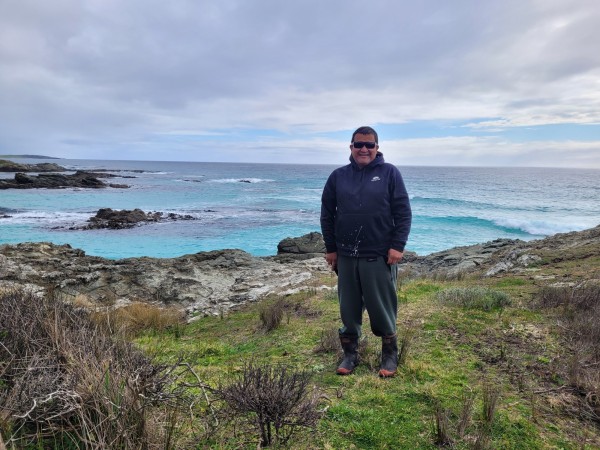
Graeme Atkins, exploring Rēkohu/Wharekauri.
It’s true, there are plenty of differences between the Chathams and the East Cape. The Raukūmara ranges are vast and steep; the Chathams are much flatter and don’t have nearly as much bush. Although possums are a big issue for both places, the East Cape are dealing with some different pest challenges – including an overpopulation of deer.
But there were a lot of similarities, particularly given both their community and ours are rural and share similar priorities. Our projects are focused on the long term and on community taking a lead role. We also both consider environmental restoration to be about people as well as plants and animals.
Key insights for restoration projects
A few things Graeme shared resonated strongly with us:
- When the environment's suffering, people do too. Some key examples he gave were damaged waterways and unhealthy hunting stock.
- The community has the power to take a lead in restoring their land. This can also create some awesome jobs for locals.
- Getting kids and young people involved in their environment and in the restoration of their place is key for the future!
- It's important to understand the reality of the environment’s current state, so that tools that will actually do the job properly can be used. In the case of the Raukūmara Pae Maunga project, that meant incorporating toxins into predator control efforts alongside other methods like traps.
- It can take a long time to get a big restoration project going, but it's worth it. And it's worth doing it right.
There was a great turnout to Graeme’s talk, and heaps of questions from community members and tourists.
We really enjoyed hosting Graeme on our island. He’s been involved in conservation for 30 years (and was even a semi-finalist for the 2024 Kiwibank New Zealander of the Year) so has a wealth of experience. He’s also a mega plant nerd, so we took the chance to show him around a few incredible spots on the main island while he was here.
Learn More
Shut your trap (on an introduced predator)
Our Predator Free Coordinator Hamish led a great hands-on trap session at Kōpinga Marae. Hamish, with help from Graeme and our Trustee Mike, brought out some traps for show-and-tell and dusted off their pest control knowledge.
From the classic little Victor to the high-tech AT220, people had a chance to get a good look at different traps and see how they work. It was also a chance to ask questions and learn about methods that support trapping, like bait stations, and using chew cards and tracking tunnels for monitoring. Locals, visitors to the island, and even the US Ambassador had some good yarns with the team.
Another highlight of this day was launching the Predator Free video. It’s all about our island and features a few of our islanders, so it was great that they got the premiere showing!
If you haven’t checked it out, give it a watch now! Huge thanks for Predator Free 2050 for all the resources and support they put into getting this ace video made.
Celebrating science on the Chathams
We were stoked to be part of the Chatham Islands Festival of Science again this year! The event has been held annually since 2021. It bring together locals, researchers, and visitors to celebrate the islands' unique environment through fun activities and talks.
This year’s talks covered a wide range of topics: geology, work to protect the endangered Chatham Island oystercatcher, infrasound and global monitoring, caring for historic wooden structures, assessing habitation and fish species in non-commercial fishing reserves, predator control, and the 150-year Anniversary of the Transit of Venus. A huge thanks to Massey University and some of their amazing staff who took the lead organising the event, the Science House, and all the different groups and individuals on the island who pulled together to make the Festival of Science possible.
If you’re keen on science or the Chatham Islands, the annual Festival of Science is one of the best times of year to visit. Keep an eye out on the Chatham Islands Tourism Facebook page for updates about what’s happening next year.

